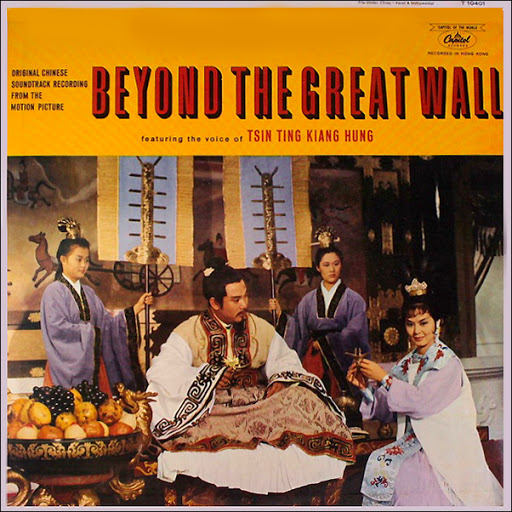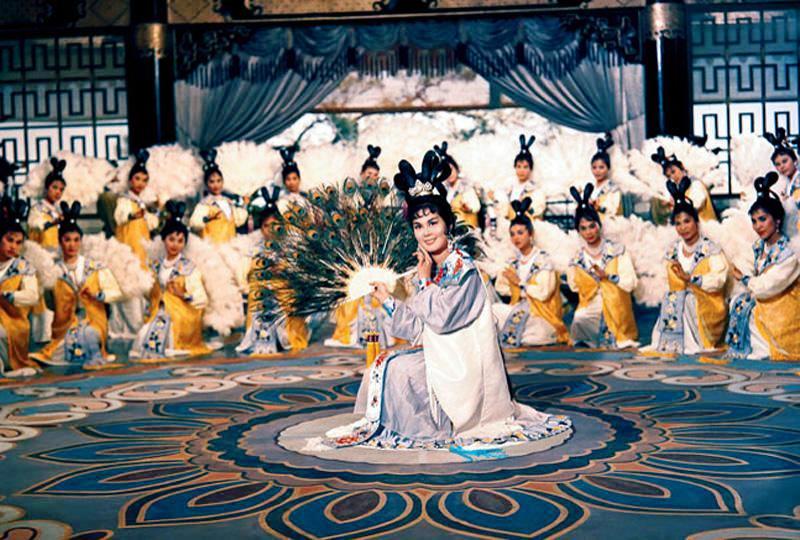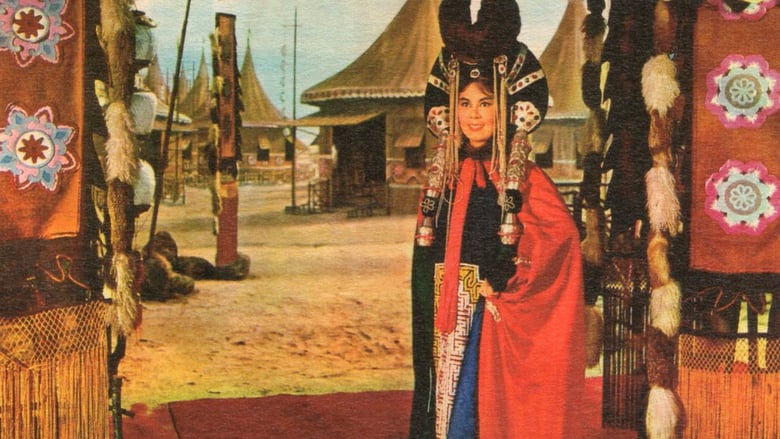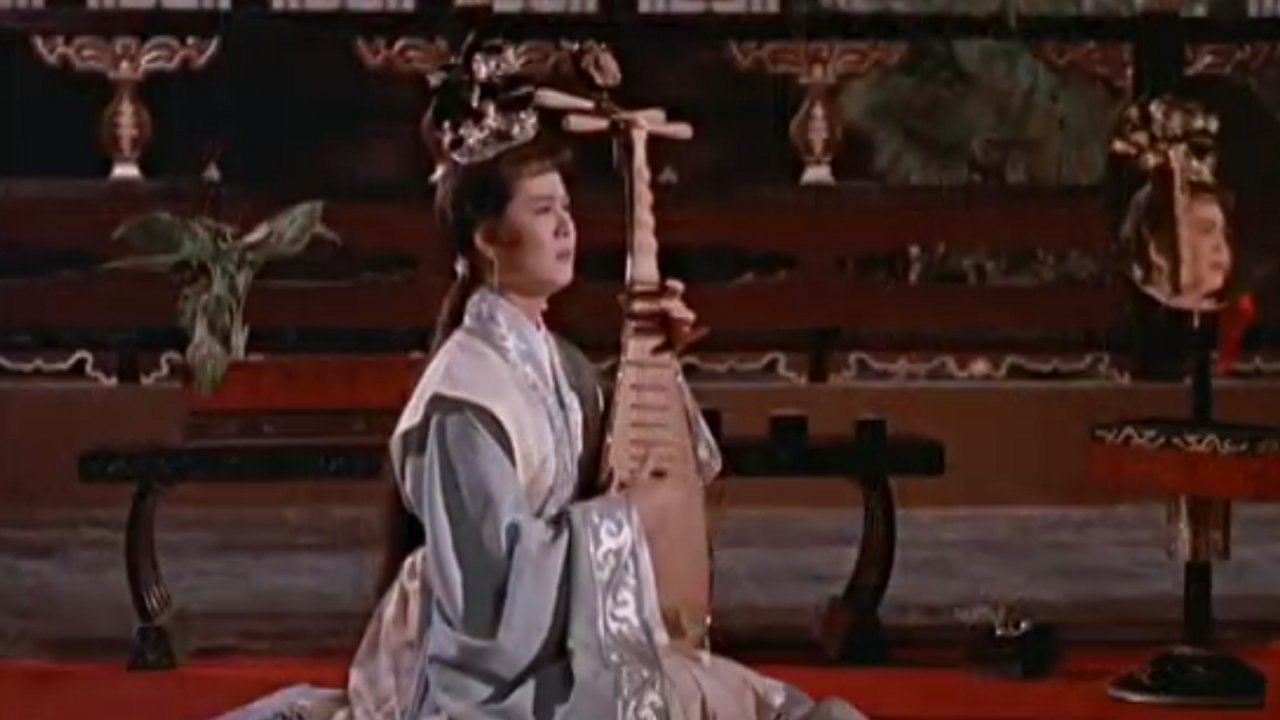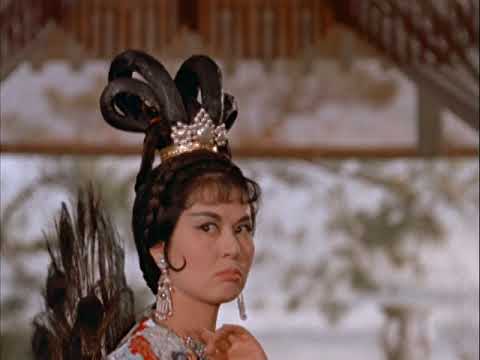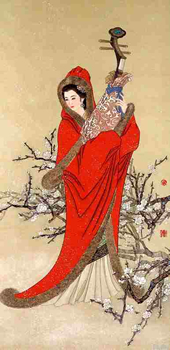Beyond the Great Wall
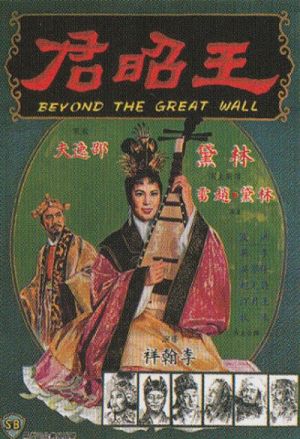
Director: Lin Han-Hsiang
Year" 1964
Rating: 8.0
From the late 1950's for about ten years the huangmei diao genre was enormously
popular in Hong Kong, Taiwan and the Chinese diaspora around the world.
The Shaw Brothers were to produce about thirty of them. I think the timing
was right for culturally nostalgic films of the motherland that told stories
based on folklore, legend and history. Every country has periods when they
look backwards to a mythical land and time that exists as much in their imagination
as in reality. The mass exodus from the Mainland after the Civil War to
places unfamiliar in which the new residents found themselves often to be
minorities or simply looked upon as intruders made them yearn for their
home country - but not the one of the disastrous 20th century but of times
far in the past. The huangmei diao films with their settings in royal houses
and the ornate lavish surroundings, brilliant costumes and endless extras
were dazzling epics with song and lovely orchestrations that wrought every
emotion out of the story. Though huangmei diao is often just termed Chinese
opera, it is actually a mixing of various styles of opera, folk songs and
pop that is quite melodic and not the assault on the ears that strict Peking
Opera can be. I have quite gotten to like it. There are a few great songs
in this one that push the story along, have an emotional impact and are lilting
and melodic.
Interestingly, it was the Mainland that brought Chinese opera films to
Hong Kong and one of them titled The Heavenly Match was a huge success in
1955. This gave Li Han-Hsiang the opportunity he had been looking for and
he went to Run Run Shaw and convinced him to produce a huangmei diao film.
Li was one of those exiles from the Mainland, leaving in 1948 at the age
of 22 and he got into the film business first as a bit actor and a dubber
for Japanese films into Mandarin but had been directing since 1954. He was
a painter and a scholar who loved the old styles and wanted to recreate
them on screen - similar I think to King Hu - but one went the route of wuxia
and the other opera but in a sense they were reaching for the same thing.
His first huangmei diao was Diau Charm which starred Linda Lin Dai and Chao
Lei - these two were teamed up for this film as well as two other operas
The Kingdom and the Beauty and Madam White Snake.
It is a simple tragic tale that the film relates - one that has been told
in many versions and songs. It takes place during the reign of Emperor Yuan
(Chao Lei) of the Han dynasty. He was as the film puts it a womanizer and
if you are the Emperor being a womanizer comes easy. Sort of like the minor
leagues in baseball, scouts roam the country looking for suitable bedmates
- ie concubines - for the Emperor and are able to secure their services.
Zhaojun (Lin Dai) is one such woman. She enters into the palace - one among
many - for the Emperor to chose from. With so many women - thought to be
over 3,000 - to chose from the Emperor has the court artist draw them and
then in his leisure time he can look through the portraits and chose one.
Sort of like going to a matchmaker with her book. The artist Mao Yanshou
was a crook though and demanded bribes to paint a flattering portrait or
a very unflattering portrait should he not get it.
Zhaojun refuses to pay. So for the next three years she is never called
by the Emperor and becomes depressed and miserable - again because he doesn't
basically bed her. This may not play so well in modern times - she is basically
chattel but willing chattel. One day in passing the Emperor hears her playing
the pippa and looks in and sees - well Linda Lin Dai! He is pissed. The
painter runs for his life and the Emperor and his new concubine play chess
all night according to the song - chess is one term for it I guess. Queen
mates King. He rids himself of all the other women and life is good until
circumstances come around that force him to send Zhaojun to a Mongol lord
in order to stop a war. That doesn't end well.
Large chunks of this are in fact true history - you can look it up - and
a big chunk of it is made up for dramatic and tragic reasons - or better
to make the audience weep. The real story is not so tragic but still very
interesting. Emperor Yuan (75 BC to 33 BC) had a huge stash of women. Zhaojun
was chosen to be part of the stable of women and she refused to pay a bribe
and sat around for a few years doing nothing. Which is a shame because she
is in Chinese folklore considered one of the Four Great Beauties of Chinese
history - the other three for those interested were Xi Shi in the 6th century
BC, Diaochan in the third century and Yang Guifei in the 8th century. Hard
to verify this of course. Zhaojun was apparently so beautiful that birds
would stop flying and fall out of the sky. The Mongol Lord who wants a closer
relationship with the Emperor asked to marry a daughter of his and the Emperor
thought - hmmm - I can pass off any woman as a Princess and told his advisors
to find one - but an ugly one - from the portraits. Someone he would not
miss.
They gather some of the least attractive women - per picture - and ask
for a volunteer to marry a barbarian far to the north who lives in a tent.
Only Zhaojun raises her dainty hand. It has to be better than sitting around
here all ay playing my pippa. After she has been promised and the wedding
set, only then does the Emperor see her and he goes nuts - because 3000
girls are not enough and he is allowing her to get away. Mao Yanshou is executed.
She goes to live with the Mongol Lord - and lives happily ever after. Has
two children with him and when he died she married his brother and had two
more! A nice life. She is credited with bringing peace between the Hans and
the Mongols for many years. And became a legend.
The sets and everything are gorgeous - a spectacle - and though the story
is a bit slow in getting going by the end it hits you. It is nearly a one
man - or make that one woman show by Linda Lin Dai - though credit must
be given to Tsin Ting who sings for her (and does in many of these films).


